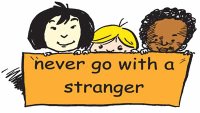"Stranger Danger'...ineffective?
 While still reading about the JonBenet Ramsey case, I've been googling a bunch on protecting our kids. I came upon a recent article by Nancy McBride, National Safety Director for the
While still reading about the JonBenet Ramsey case, I've been googling a bunch on protecting our kids. I came upon a recent article by Nancy McBride, National Safety Director for the It detailed the confusion with the 'stranger danger' message taught to young children and why the NCMEC believes it's time to for our society to retire this particular phrase and thinking. When we tell children to “never talk to strangers,” we have effectively eliminated a key source of help for them if they are in trouble, which makes complete sense to me. If they’re lost they may be surrounded by many “strangers” who could conceivably help them if they would only ask for it. Since we know parents and guardians can’t be with their children every second of the day, we need to give children “safety nets” of people they can go to if they need help. Those individuals may include uniformed law-enforcement or security officers; a store salesperson with a nametag; the person in an information booth at a mall or other public venue; or a mother with children. In specific situations such as being lost outside, the safety messages need to be tailored to those circumstances.
 Here are some of their recommendations:
Here are some of their recommendations:• A child should never wander away from where they first became lost. If they stay put, chances are better that they will be found more quickly.
• If the child gets lost in conditions like a thunderstorm or near an overflowing riverbank, then the child needs to go to the nearest safe spot and wait for rescuers.
• Children should make noise either by yelling, blowing a whistle, or just attracting attention. This will help in bringing someone to their rescue.
Parents and guardians can make child safety part of a child’s everyday life in a non-threatening way by practicing some of these skills. Whether it’s checking first with a trusted adult, taking a friend, or avoiding and getting out of dangerous situations, there are easy “what if” scenarios to practice with your children to make sure they “get it." Make outings to a mall or park an opportunity to reinforce these skills. That way they won’t have to wonder what to do if lost or in danger. Do this on a regular basis to make sure it becomes second nature. At the same time reassure them you are there for them, and remind them there are other people who can help.
- LT



0 Comments:
Post a Comment
<< Home